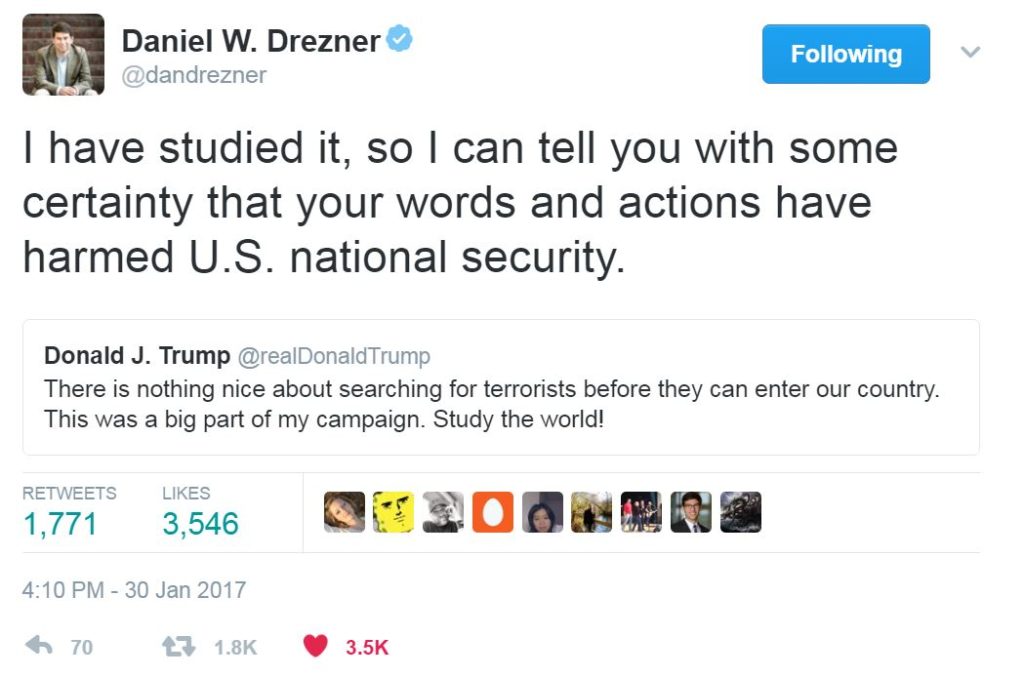 “Study the world!” brayed Trump on Twitter last week, in defense of his travel ban. Dan Drezner, who studies the world for a living, shot back:
“Study the world!” brayed Trump on Twitter last week, in defense of his travel ban. Dan Drezner, who studies the world for a living, shot back:
“I have studied it, and I can tell you with some certainty that your words and actions have harmed US national security.”
On Facebook, I’ve seen friends and colleagues with PhDs in international relations post their own versions of Dan’s tweet:
Andrew Moravcsik: “I have studied the world, and people who say they are going to change history generally repeat it.”
Richard Price: “Those who seek power by dividing ultimately succumb to those who unite to oppose.”
Tanisha Faizal: “I have studied the world, and international norms don’t last forever. Proceed with caution.”
Deborah Avant: “I have studied the world, and extremism toward an external other often turns inward.”
Steve Saideman: “The international order has been good to the US. We shouldn’t break it.”
Peter Andreas: “Building walls and imposing bans is a good way to make enemies, not friends.”
Sarah Parkinson: “I have studied the world and learned that protest matters for visibility and solidarity.”
Joel Oestreich: “When countries want to do bad things, there’s nothing they like more than saying ‘see, the US does it too!’
Patrick Jackson: “Human identities are not facts, they are political strategies.”
Heather Roff: “I have studied the world, and learned that the failure to see people in other countries as fellow humans makes people do terrible things.”
Stephanie Carvin: “In America terrorists are usually homegrown, rarely immigrants and almost never refugees.”
Paul Musgrave: “I have studied the world and learned dramatic departures in US foreign policy have effects that can last for decades.”
As you can see, with these three little words Trump has handed IR scholars both a challenge and a natural rallying cry in the run-up to #ISA2017 and the March for Science on April 22. If IR scholars are good at anything, it’s studying the world, and if a President ever needed our advice from IR scholars, it’s this one who doesn’t seem to know nuclear weapons from climate change.
So today, I propose the following social media challenge to my fellow IR scholars: condense the most useful finding, fact, or causal truth YOU’VE learned by “studying the world” into a pithy remark of no more than 125 characters. Tweet it to @realDonaldTrump with the hashtag #StudytheWorld! Then go on Facebook and post it on your wall with this message:
IR Scholars #StudytheWorld! Facebook Contest: Duck of Minerva is crowd-sourcing pithy IR knowledge to share with Trump today. Leave a simple, policy-relevant causal truth or evidence-based claim about global politics on your wall with the hashtag #StudytheWorld! Tag three friends who are professors of global affairs or comparative politics and ask them to do the same. If you like, add a link to a book or study President Trump should read. The best replies will be featured in a special future post.
Charli Carpenter is a Professor in the Department of Political Science at the University of Massachusetts-Amherst. She is the author of 'Innocent Women and Children': Gender, Norms and the Protection of Civilians (Ashgate, 2006), Forgetting Children Born of War: Setting the Human Rights
Agenda in Bosnia and Beyond (Columbia, 2010), and ‘Lost’ Causes: Agenda-Setting in Global Issue Networks and the Shaping of Human Security (Cornell, 2014). Her main research interests include national security ethics, the protection of civilians, the laws of war, global agenda-setting, gender and political violence, humanitarian affairs, the role of information technology in human security, and the gap between intentions and outcomes among advocates of human security.

Re Patrick T. Jackson’s “human identities are not facts, they are political strategies”:
The statement is somewhat contestable, and anyway Trump won’t understand it.
p.s. I don’t have a Twitter account or a Facebook account, so I will not be participating in this ‘social media challenge’.
Charli quite reasonably edited for Twitter length and style. What I actually posted in reply to her query was: “Claims about homogenous human identities are never factually accurate descriptions; they are political strategies intended to _impose_ homogeneity and draw conclusions from that supposedly homogeneous identity. That’s a scalable claim, true of individuals, groups of all sizes, nations, states, civilizations, and humanity as a whole.” Hou are correct that Trump is unlikely to read or understand that. But I stand by it all the same.
@ProfPTJ: Thanks for providing the extended version.
LFC, I think you have a point – Trump is not listening to any facts no matter how concisely stated. This exercise is meant as much for informing the general public and affirming the value of evidence-based policy, as aimed at influencing Trump. If you’d like to leave a nugget of wisdom based on your studies of the world and you don’t have Twitter or FB, feel free to use this comment thread! :)
Ok, mulling over nuggets. I think the list in the OP is a pretty good start.